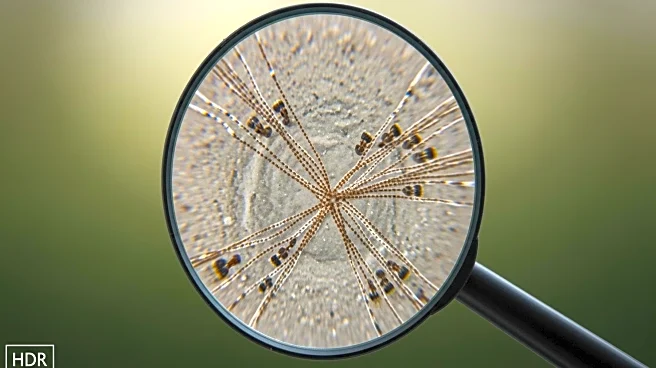What is the story about?
What's Happening?
Researchers have uncovered a novel gene regulation mechanism in ants that allows them to maintain a precise sense of smell. The study, published in Current Biology, reveals how each neuron in ants selects a single odorant receptor from a vast array of genes, ensuring clear sensory signals. This discovery was made through research on the clonal raider ant, which possesses hundreds of odorant receptor genes. The mechanism involves RNA polymerase continuing past the chosen receptor gene, silencing downstream genes, while antisense RNAs block upstream genes. This creates a genetic shield around the selected receptor, maintaining the 'one receptor, one neuron' principle crucial for olfactory precision.
Why It's Important?
The findings have significant implications for understanding gene regulation in insects and potentially other organisms. By demonstrating how ants manage large repertoires of olfactory receptor genes, the study provides insights into evolutionary biology and the adaptability of sensory systems. This mechanism could explain how ants rapidly expand their olfactory capabilities, offering a model for gene family regulation. The research highlights the importance of studying diverse species to uncover fundamental biological processes, which could lead to advancements in genetic research and applications in biotechnology.
What's Next?
The research team plans to explore whether this gene regulation mechanism is present in other social insects, such as honeybees and Indian jumping ants. Further studies may investigate the broader distribution of this mechanism among insect species with extensive olfactory receptor gene repertoires. Understanding this process could lead to new approaches in genetic engineering and the development of technologies that mimic or enhance sensory systems in various applications.
Beyond the Headlines
This discovery opens up possibilities for exploring how similar gene regulation mechanisms might operate in other organisms, potentially influencing fields like synthetic biology and genetic engineering. The study suggests that tightly clustered gene families can be regulated through transcriptional interference, offering a blueprint for managing complex genetic systems. This could have implications for developing new methods to control gene expression in research and medical applications.
















